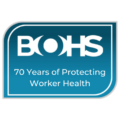Award-Winning Research Highlights Urgent Need for Action on Silica Dust Exposure
The British Occupational Hygiene Society (BOHS), the Chartered Society for Worker Health Protection, has awarded its prestigious Thomas Bedford Memorial Prize to a study on the deadly health risks faced by workers in the artificial stone benchtop fabrication industry.
The winning paper, “Silica Exposure Estimates in Artificial Stone Benchtop Fabrication and Adverse Respiratory Outcomes”, led by Professor Deborah Glass and published in Annals of Work Exposures and Health, provides important evidence linking job exposure patterns with increased risk of respiratory disease among workers exposed to respirable crystalline silica (RCS) from artificial or engineered stone. Professor Rachael Jones, Chief Editor of Annals, said “The review committee felt this study integrated work exposures and health outcomes to address a critical worker health issue, and in so doing reflects the values of BOHS and Annals.”
Silicosis—an incurable, preventable lung disease—has become a growing epidemic among workers who cut, grind, and polish artificial stone. The issue gained prominence in Australia, where this research was conducted, but is increasingly recognised as a global occupational health crisis, with the UK’s Health and Safety Executive recently updating its guidance to address the growing risk.
Professor Glass, an international leader in occupational health research and longstanding member of Annals Editorial Board, led the team in identifying key metrics—such as the percentage of time spent dry cutting and time working on artificial stone—as effective indicators of cumulative silica exposure. These insights offer vital tools for better risk assessment and targeted intervention in a sector where direct exposure measurements are often lacking.
“Research like this is more than just academic—it saves lives,” said Professor Kevin Bampton, CEO of BOHS. “This study highlights how robust occupational hygiene research can directly inform real-world protection for workers facing life-threatening hazards.”
Professor Glass will deliver the Thomas Bedford Memorial Prize talk at the OH2025 conference, where she will present the findings of this important study and discuss their implications for global occupational health practice.
Engineered stone has been banned in Australia, and with media investigations highlighting silicosis-related deaths among young workers in the UK, action to prevent exposure is critical.
In support of this, BOHS recently launched a free online silica dust awareness tool aimed specifically at kitchen worktop workers, offering practical guidance to reduce exposure risks in real-life scenarios. This initiative is part of the Society’s wider commitment to preventing exposure-related disease and protecting workers’ health.
Annals continue to be a vital platform for peer-reviewed research on silica and engineered stone. A curated collection of key articles in this field, selected by Professor Glass, is available via the journal’s website https://academic.oup.com/annweh/pages/artificialstone, helping occupational health professionals, regulators and employers access the latest evidence in this area of concern.






